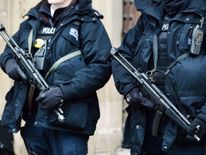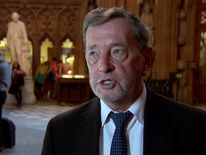The vast majority of convicted terrorists jailed over the past 15 years are now back on Britain's streets, a Sky News investigation has discovered.
Around three-quarters of the 583 people imprisoned on terror charges in the years since the 9/11 attacks have now served their sentences and been released from UK prisons, many still holding the same extremist beliefs that got them jailed in the first place.
Sky News has been told that around two-thirds of those released refused to engage with prison deradicalisation programmes aimed at addressing their extremist behaviour.
It comes as MI5's director general said today that police and intelligence services had foiled 12 terror plots since June 2013
The release of 418 terror prisoners, many from the al Qaeda generation of offenders, is posing an increasingly difficult challenge for police and the security services, which are already stretched to the limit dealing with the threat from Islamic State-related terrorism.
Among those released in recent years are three men who helped the four London suicide bombers plan the 7/7 attacks in 2005.
Seven men who formed part of the wider circle around the failed 21/7 plot two weeks after the London bombings are also free.
As are five people who plotted a dirty bomb attack in the capital in 2004.
Lord David Blunkett, who oversaw many of those terrorist convictions, said there now had to be a more robust programme to properly monitor those who were back in the community.
He told Sky News: "It's perfectly reasonable to say that once someone's served their sentence, if it isn't possible to reassess them, we should continue to monitor them outside prison.
"So, if there's any indication at all that they are reconnecting with organised terrorist groups, the intervention can take place very quickly rather than allowing them to commit another act and then having to try to pick them up again."
Omar Khyam, who led a plot to detonate huge fertiliser bombs at a Kent shopping centre and a nightclub, is among the two-thirds of terrorist prisoners who refused to engage with efforts to address their extremist behaviour.
As is Abdullah Ahmed Ali, the lead plotter in a terror cell which planned to blow up transatlantic airliners with liquid bombs.
Our research reveals that 164 convicted terrorists have been released from jail in the last two years alone.
During that period, 104 were freed after serving sentences of between 12 months and four years, the range of sentence normally handed down to those supporting and encouraging terror groups or plots.
Some 24 were released from prison having served more than four years - and are likely to have played more of a part in terrorist planning.
Three were released in the last couple of years after serving life sentences for terror offences.
Hanif Qadir, a former jihadi who now runs a counter-extremism outreach programme said the prison deradicalisation scheme is "failing miserably".
He said: "There are experts out there that are equipped and able to tackle the problem but they are not the ones that are doing it in prison.
"At the moment the prison imams, God bless them, they're not adequate and they're not experienced enough to tackle the problem of radicalisation within prisons."
Some of those who refused to co-operate with prison deradicalisation programmes have already gone on to reoffend.
Nabeel Hussain was jailed for his part in the 2006 liquid bomb plot. He was released from an eight year sentence, but is back in jail after he was caught trying to travel to Syria to join IS.
Abu Bakr Mansha, imprisoned in 2005 for a plot to murder a British soldier who had served in the Iraq war, was also freed. But he was locked up again for assaulting a group of youngsters in a religiously motivated attack.
Another man, Mizanur Rahman, was jailed originally for his support of a banned extremist organisation. He was released but then jailed again in September 2016, along with Anjem Choudary, on charges they invited support for IS.
Richard Walton, the former head of Scotland Yard's counter terror command, said that "very few" of those convicted of IS-related terrorism had reformed.
He told Sky News: "It's almost as if this particular version of Islam is so potent that once somebody is brainwashed with this ideology it almost feels like it is irreversible and there are very few examples from around the world where somebody has rejected IS ideology having subscribed to it before."
Many other terror prisoners are due for release in the UK over next few years.
There is understandable concern that a significant proportion continues to resist attempts to reform and may still be committed to violent extremism.






No comments:
Post a Comment